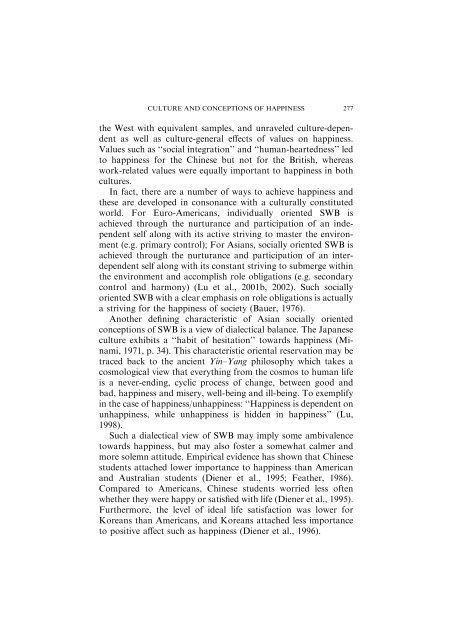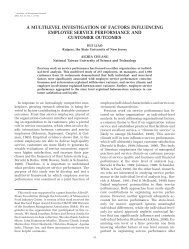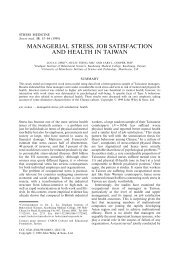CULTURE AND CONCEPTIONS OF HAPPINESS: INDIVIDUAL ...
CULTURE AND CONCEPTIONS OF HAPPINESS: INDIVIDUAL ...
CULTURE AND CONCEPTIONS OF HAPPINESS: INDIVIDUAL ...
Create successful ePaper yourself
Turn your PDF publications into a flip-book with our unique Google optimized e-Paper software.
<strong>CULTURE</strong> <strong>AND</strong> <strong>CONCEPTIONS</strong> <strong>OF</strong> <strong>HAPPINESS</strong> 277the West with equivalent samples, and unraveled culture-dependentas well as culture-general effects of values on happiness.Values such as ‘‘social integration’’ and ‘‘human-heartedness’’ ledto happiness for the Chinese but not for the British, whereaswork-related values were equally important to happiness in bothcultures.In fact, there are a number of ways to achieve happiness andthese are developed in consonance with a culturally constitutedworld. For Euro-Americans, individually oriented SWB isachieved through the nurturance and participation of an independentself along with its active striving to master the environment(e.g. primary control); For Asians, socially oriented SWB isachieved through the nurturance and participation of an interdependentself along with its constant striving to submerge withinthe environment and accomplish role obligations (e.g. secondarycontrol and harmony) (Lu et al., 2001b, 2002). Such sociallyoriented SWB with a clear emphasis on role obligations is actuallya striving for the happiness of society (Bauer, 1976).Another defining characteristic of Asian socially orientedconceptions of SWB is a view of dialectical balance. The Japaneseculture exhibits a ‘‘habit of hesitation’’ towards happiness (Minami,1971, p. 34). This characteristic oriental reservation may betraced back to the ancient Yin–Yang philosophy which takes acosmological view that everything from the cosmos to human lifeis a never-ending, cyclic process of change, between good andbad, happiness and misery, well-being and ill-being. To exemplifyin the case of happiness/unhappiness: ‘‘Happiness is dependent onunhappiness, while unhappiness is hidden in happiness’’ (Lu,1998).Such a dialectical view of SWB may imply some ambivalencetowards happiness, but may also foster a somewhat calmer andmore solemn attitude. Empirical evidence has shown that Chinesestudents attached lower importance to happiness than Americanand Australian students (Diener et al., 1995; Feather, 1986).Compared to Americans, Chinese students worried less oftenwhether they were happy or satisfied with life (Diener et al., 1995).Furthermore, the level of ideal life satisfaction was lower forKoreans than Americans, and Koreans attached less importanceto positive affect such as happiness (Diener et al., 1996).

















